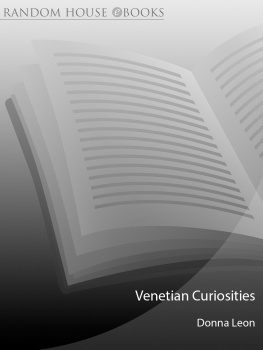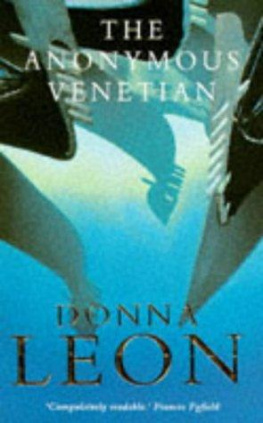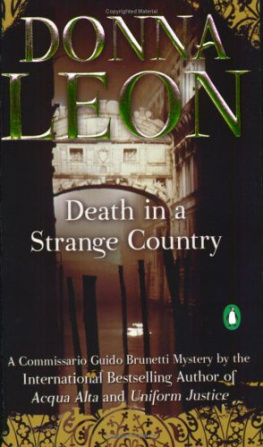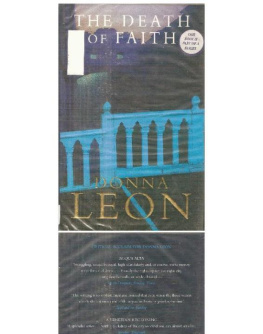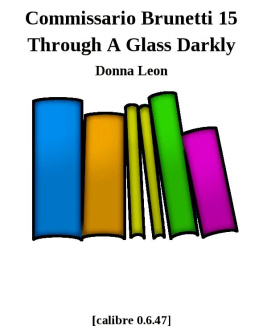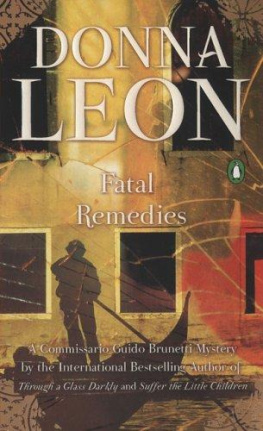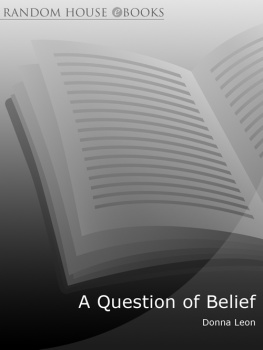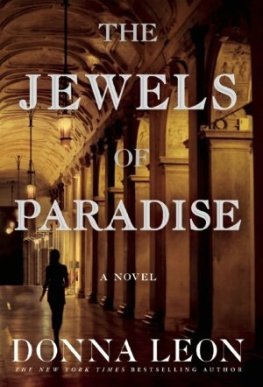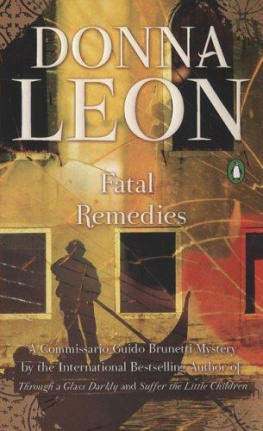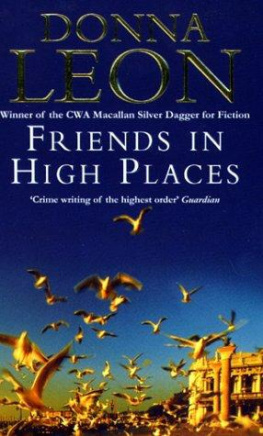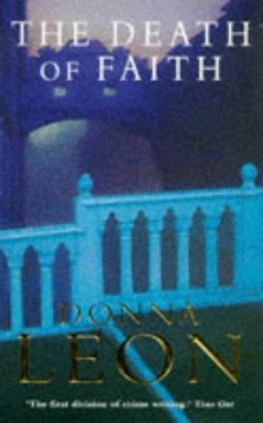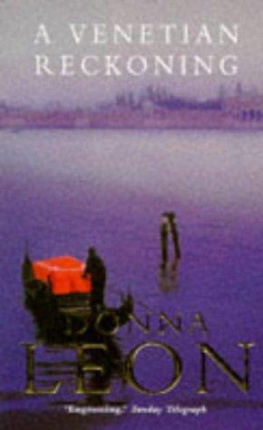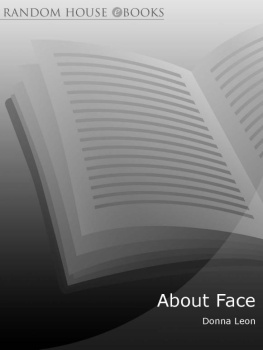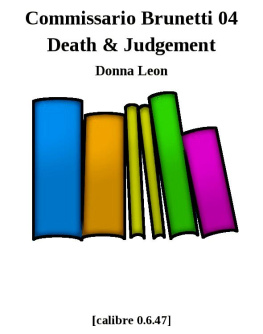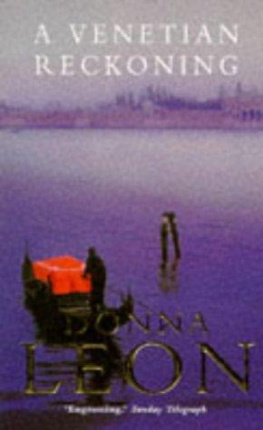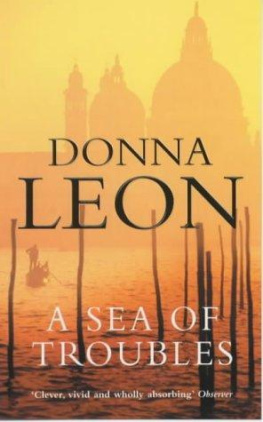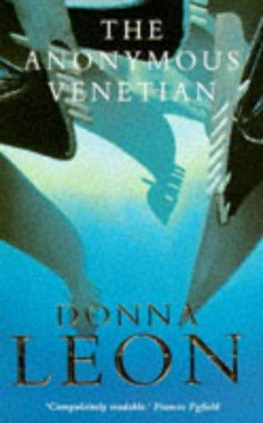Donna Leon - Venetian Curiosities
Here you can read online Donna Leon - Venetian Curiosities full text of the book (entire story) in english for free. Download pdf and epub, get meaning, cover and reviews about this ebook. year: 2011, publisher: Random House, genre: Detective and thriller. Description of the work, (preface) as well as reviews are available. Best literature library LitArk.com created for fans of good reading and offers a wide selection of genres:
Romance novel
Science fiction
Adventure
Detective
Science
History
Home and family
Prose
Art
Politics
Computer
Non-fiction
Religion
Business
Children
Humor
Choose a favorite category and find really read worthwhile books. Enjoy immersion in the world of imagination, feel the emotions of the characters or learn something new for yourself, make an fascinating discovery.
- Book:Venetian Curiosities
- Author:
- Publisher:Random House
- Genre:
- Year:2011
- Rating:3 / 5
- Favourites:Add to favourites
- Your mark:
- 60
- 1
- 2
- 3
- 4
- 5
Venetian Curiosities: summary, description and annotation
We offer to read an annotation, description, summary or preface (depends on what the author of the book "Venetian Curiosities" wrote himself). If you haven't found the necessary information about the book — write in the comments, we will try to find it.
Venetian Curiosities — read online for free the complete book (whole text) full work
Below is the text of the book, divided by pages. System saving the place of the last page read, allows you to conveniently read the book "Venetian Curiosities" online for free, without having to search again every time where you left off. Put a bookmark, and you can go to the page where you finished reading at any time.
Font size:
Interval:
Bookmark:
Contents
Donna Leon was born in New Jersey in 1942 but she has lived in Venice since 1981. Commissario Guido Brunetti has brought Leon international fame, but baroque music is no less important to her. In 2011, she was named the honorary president of the Venetian Centre for Baroque Music, which is devoted to the promotion and dissemination of baroque music in all of its many forms.
In a city as ancient as Venice, myths and legends passed down from generation to generation record more than just love or murder. They are the storehouse of a citys mores, emblems of its identity. In Venetian Curiosities, acclaimed novelist Donna Leon recounts some of Venices most intriguing tales: an elephant brought in for Carnival wreaks havoc upon the city before seeking refuge in a church, the city employs prostitutes in an attempt to prevent homosexuality, innocent men are mistakenly condemned to death, a gambler bets the family palazzo. In an introduction and seven essays, Leon offers enchanting details and astute insights into Venetian customs of the past and present.
Also by Donna Leon
Death at La Fenice
Death in a Strange Country
The Anonymous Venetian
A Venetian Reckoning
Acqua Alta
The Death of Faith
A Noble Radiance
Fatal Remedies
Friends in High Places
A Sea of Troubles
Wilful Behaviour
Uniform Justice
Doctored Evidence
Blood from a Stone
Through a Glass, Darkly
Suffer the Little Children
The Girl of His Dreams
About Face
A Question of Belief
A Taste of Venice
Drawing Conclusions
Handels Bestiary
Beastly Things
The Jewels of Paradise
The Golden Egg
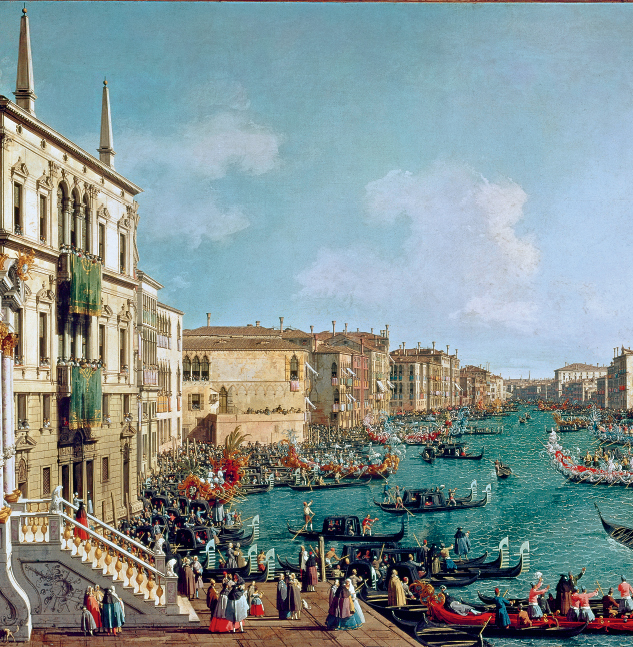

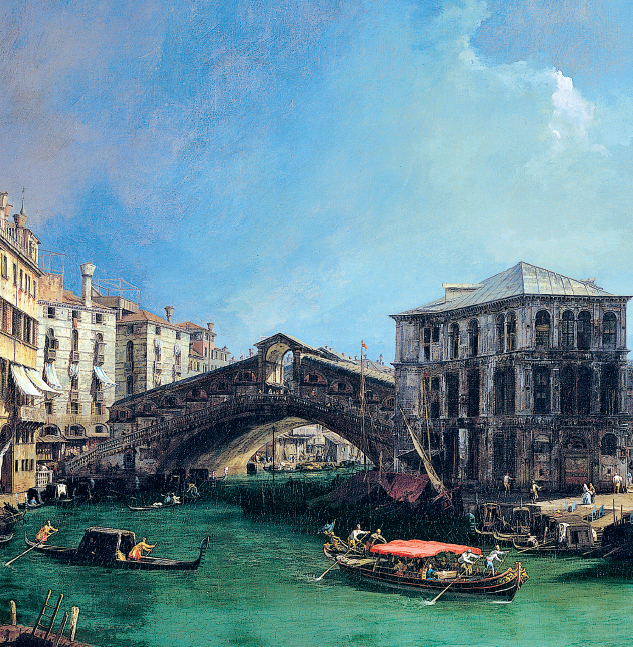
JUST AS THE person coming to live in Venice has many physical realities to adjust towalking, always walking; climbing up and down bridges and stairs; the delicate undulance of travel by waterthey must also know about a kind of undulance in the accuracy with which events are reported: the further back in time the origin of the story, and the more retellings it has experienced, the rougher the waters of truth grow.
In Venice, the marketplace and the dinner table are two of the principal sites for the dissemination of (mis)information. Many of the stories told by Venetians about their city pass through either or both of these sites, and in them, over the decades, Ive heard many variants of a story that deals with how some people still living here behaved during the war. Enough time has passed for every Venetian to have been reminted as an ardent member of the Resistance, so overt collaboration is seldom a subject; instead, this story remains true to that age-old Venetian theme: sharp business dealings. On six occasions, and from six different people of three separate nationalities, I have heard a story that recounts the purchase for almost nothing of a portfolio of Tiepolo drawings (with the variant of selected Old Master prints) from someone who is reported to have been both a man and a woman and both a Jew and a Christian, but who was always desperate to sell the drawings. The constants are the name of the purchaser, the fact that he took advantage of the misery and desperation of the seller, the current location of the drawings, and the underlying duplicity of the deal.
Think of a risotto. It begins with un fondo, the basis of the dish, which can be made of anything: asparagus, shrimp, pumpkin, even simple broth. As the risotto cooks, other things get stirred in, each new ingredient changing the taste. Finally, toss in some rice and add boiling broth. More broth, and let it boil until its done. Or start with rumor; if you prefer, start with fact, keep adding and keep stirring: the taste is sure to change with each new ingredient. In the end, you will have risotto, or you will have Venetian curiosities.
Because Venetians were, and remain, merchants, they are also fierce and devoted keepers of records: some of the documents in the Archivio di Stato date back a thousand years. The aisles in the Archivio are reported to fill some three hundred rooms and the shelves are said to run for seventy kilometers. Contained thereinalong with official governmental decrees and private historical accounts as well as the reports of spies and the policeare the records from civil and judicial authorities that report, with rigorous accuracy, those events that led to legal actions, the decisions of the judges, and the consequences of those decisions.
The stories recounted in Venetian Curiosities have their origin in the Archivio and in the records that Venetians have been depositing there for a millennium. The versions we hear or read today, however, have been added to and neatened up by centuries of rumor and retelling. Todays reader would perhaps find strange the casual reference to torture as a sure way of finding the truth and the equally casual assumption that persons of high estate wereas Orwell would have itmore equal than other citizens, were it not for the return to fashion of the first belief and the continued endurance of the second. These strange stories of the city, or perhaps more accurately, these stories of a strange city, will, it is hoped, suggest the ways in which the constancy of human nature makes us resemble these people who, centuries ago, acted and suffered their way through life in this wondrous city.
Many of the curious things that happened in Venice and the odd creatures who passed through the city were painted by Pietro Longhi, an eighteenth-century artist who delighted in showing his fellow Venetians what they and their city looked like. Longhi was a master storyteller. He picks out scenes from daily life and shows us their often candlelit normalcy, leaving us to create the story that might make them make sense. In his paintings can be found the famous rhinoceros, countless ordinary dogs, mice, and monkeys. He left us a portrait of Magrat, the famous Nordic giant, captured in his red-suited glory, as well as of less conspicuous residents of the city, most of them engaged in the unexciting business of their daily lives.
Canaletto is certainly the most famous painter of Venice (as different from the most famous Venetian painter). Unlike Longhi, who remains indoors, Canaletto takes us outside and flaunts stunning long views of the exterior beauty of the sun-swept city. At times almost photorealistic, Canalettos grand paintings show the city in its most attractive light, a vision likely to appeal to his wealthy Northern European clients, who wanted this record of light and life to take back home to their darker countries. He also produced capricci, curious paintings of buildings that did not exist in Venice or that he had arbitrarily moved from their real location to some other part of the city.
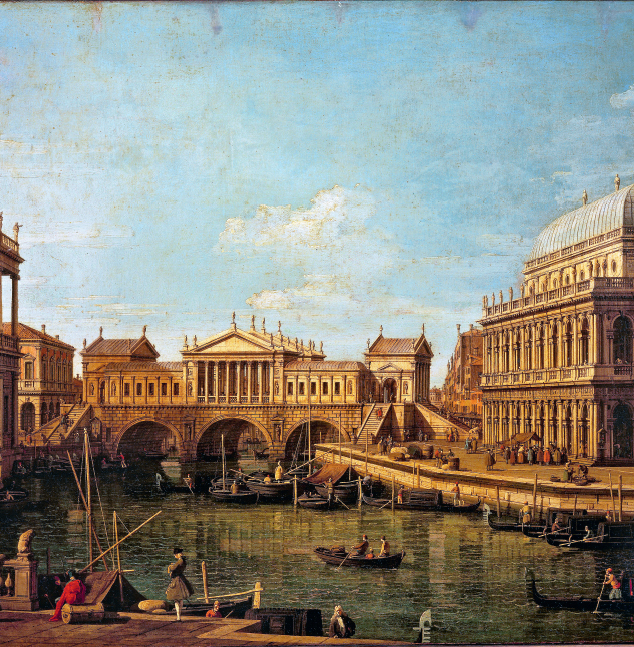
The story of the life of Vivaldi, Venices most famous composer, like so many Venetian curiosities, is told in official documents and stories that are known, or believed, to be true. The record of his birth is kept in the church of San Giovanni in Bragora: the register is there to be seen. There is the date of his ordination as a priest, 1703, as well as the dates of the composition and first performance of some of his works. And then there are the stories that have become legends: he ran from the altar while saying mass and never said mass again; he was or was not the lover of Anna Giro, one of the singers who worked most frequently with him and who lived with him during the last years of his life; he died and was buried in a paupers grave in Vienna. The blending of fact and invention, of truth and something more appealing, serves as a perfect example of the undulant nature of truth in Venice and make Vivaldi, beyond his musical genius, a true son of La Serenissima.
Next pageFont size:
Interval:
Bookmark:
Similar books «Venetian Curiosities»
Look at similar books to Venetian Curiosities. We have selected literature similar in name and meaning in the hope of providing readers with more options to find new, interesting, not yet read works.
Discussion, reviews of the book Venetian Curiosities and just readers' own opinions. Leave your comments, write what you think about the work, its meaning or the main characters. Specify what exactly you liked and what you didn't like, and why you think so.

